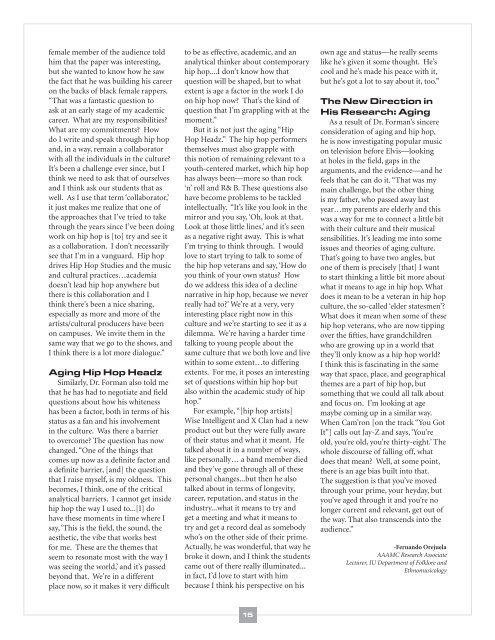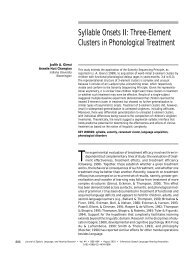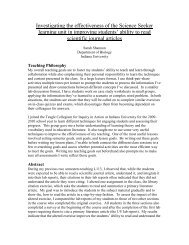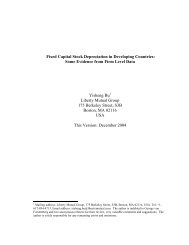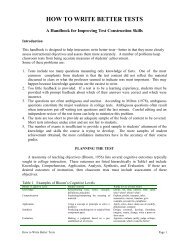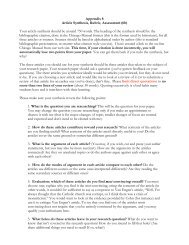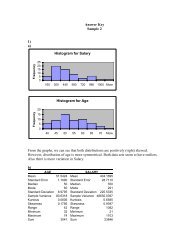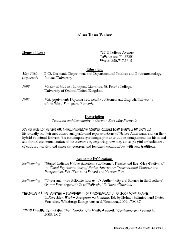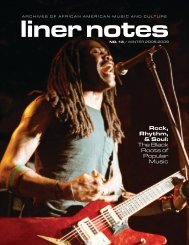Roots of Techno: Black DJs and the Detroit Scene - Indiana University
Roots of Techno: Black DJs and the Detroit Scene - Indiana University
Roots of Techno: Black DJs and the Detroit Scene - Indiana University
You also want an ePaper? Increase the reach of your titles
YUMPU automatically turns print PDFs into web optimized ePapers that Google loves.
female member <strong>of</strong> <strong>the</strong> audience told<br />
him that <strong>the</strong> paper was interesting,<br />
but she wanted to know how he saw<br />
<strong>the</strong> fact that he was building his career<br />
on <strong>the</strong> backs <strong>of</strong> black female rappers.<br />
“That was a fantastic question to<br />
ask at an early stage <strong>of</strong> my academic<br />
career. What are my responsibilities?<br />
What are my commitments? How<br />
do I write <strong>and</strong> speak through hip hop<br />
<strong>and</strong>, in a way, remain a collaborator<br />
with all <strong>the</strong> individuals in <strong>the</strong> culture?<br />
It’s been a challenge ever since, but I<br />
think we need to ask that <strong>of</strong> ourselves<br />
<strong>and</strong> I think ask our students that as<br />
well. As I use that term ‘collaborator,’<br />
it just makes me realize that one <strong>of</strong><br />
<strong>the</strong> approaches that I’ve tried to take<br />
through <strong>the</strong> years since I’ve been doing<br />
work on hip hop is [to] try <strong>and</strong> see it<br />
as a collaboration. I don’t necessarily<br />
see that I’m in a vanguard. Hip hop<br />
drives Hip Hop Studies <strong>and</strong> <strong>the</strong> music<br />
<strong>and</strong> cultural practices…academia<br />
doesn’t lead hip hop anywhere but<br />
<strong>the</strong>re is this collaboration <strong>and</strong> I<br />
think <strong>the</strong>re’s been a nice sharing,<br />
especially as more <strong>and</strong> more <strong>of</strong> <strong>the</strong><br />
artists/cultural producers have been<br />
on campuses. We invite <strong>the</strong>m in <strong>the</strong><br />
same way that we go to <strong>the</strong> shows, <strong>and</strong><br />
I think <strong>the</strong>re is a lot more dialogue.”<br />
Aging Hip Hop Headz<br />
Similarly, Dr. Forman also told me<br />
that he has had to negotiate <strong>and</strong> field<br />
questions about how his whiteness<br />
has been a factor, both in terms <strong>of</strong> his<br />
status as a fan <strong>and</strong> his involvement<br />
in <strong>the</strong> culture. Was <strong>the</strong>re a barrier<br />
to overcome? The question has now<br />
changed. “One <strong>of</strong> <strong>the</strong> things that<br />
comes up now as a definite factor <strong>and</strong><br />
a definite barrier, [<strong>and</strong>] <strong>the</strong> question<br />
that I raise myself, is my oldness. This<br />
becomes, I think, one <strong>of</strong> <strong>the</strong> critical<br />
analytical barriers. I cannot get inside<br />
hip hop <strong>the</strong> way I used to...[I] do<br />
have <strong>the</strong>se moments in time where I<br />
say, ‘This is <strong>the</strong> field, <strong>the</strong> sound, <strong>the</strong><br />
aes<strong>the</strong>tic, <strong>the</strong> vibe that works best<br />
for me. These are <strong>the</strong> <strong>the</strong>mes that<br />
seem to resonate most with <strong>the</strong> way I<br />
was seeing <strong>the</strong> world,’ <strong>and</strong> it’s passed<br />
beyond that. We’re in a different<br />
place now, so it makes it very difficult<br />
to be as effective, academic, <strong>and</strong> an<br />
analytical thinker about contemporary<br />
hip hop....I don’t know how that<br />
question will be shaped, but to what<br />
extent is age a factor in <strong>the</strong> work I do<br />
on hip hop now? That’s <strong>the</strong> kind <strong>of</strong><br />
question that I’m grappling with at <strong>the</strong><br />
moment.”<br />
But it is not just <strong>the</strong> aging “Hip<br />
Hop Headz.” The hip hop performers<br />
<strong>the</strong>mselves must also grapple with<br />
this notion <strong>of</strong> remaining relevant to a<br />
youth-centered market, which hip hop<br />
has always been—more so than rock<br />
‘n’ roll <strong>and</strong> R& B. These questions also<br />
have become problems to be tackled<br />
intellectually. “It’s like you look in <strong>the</strong><br />
mirror <strong>and</strong> you say, ‘Oh, look at that.<br />
Look at those little lines,’ <strong>and</strong> it’s seen<br />
as a negative right away. This is what<br />
I’m trying to think through. I would<br />
love to start trying to talk to some <strong>of</strong><br />
<strong>the</strong> hip hop veterans <strong>and</strong> say, ‘How do<br />
you think <strong>of</strong> your own status? How<br />
do we address this idea <strong>of</strong> a decline<br />
narrative in hip hop, because we never<br />
really had to?’ We’re at a very, very<br />
interesting place right now in this<br />
culture <strong>and</strong> we’re starting to see it as a<br />
dilemma. We’re having a harder time<br />
talking to young people about <strong>the</strong><br />
same culture that we both love <strong>and</strong> live<br />
within to some extent…to differing<br />
extents. For me, it poses an interesting<br />
set <strong>of</strong> questions within hip hop but<br />
also within <strong>the</strong> academic study <strong>of</strong> hip<br />
hop.”<br />
For example, “[hip hop artists]<br />
Wise Intelligent <strong>and</strong> X Clan had a new<br />
product out but <strong>the</strong>y were fully aware<br />
<strong>of</strong> <strong>the</strong>ir status <strong>and</strong> what it meant. He<br />
talked about it in a number <strong>of</strong> ways,<br />
like personally… a b<strong>and</strong> member died<br />
<strong>and</strong> <strong>the</strong>y’ve gone through all <strong>of</strong> <strong>the</strong>se<br />
personal changes...but <strong>the</strong>n he also<br />
talked about in terms <strong>of</strong> longevity,<br />
career, reputation, <strong>and</strong> status in <strong>the</strong><br />
industry...what it means to try <strong>and</strong><br />
get a meeting <strong>and</strong> what it means to<br />
try <strong>and</strong> get a record deal as somebody<br />
who’s on <strong>the</strong> o<strong>the</strong>r side <strong>of</strong> <strong>the</strong>ir prime.<br />
Actually, he was wonderful, that way he<br />
broke it down, <strong>and</strong> I think <strong>the</strong> students<br />
came out <strong>of</strong> <strong>the</strong>re really illuminated...<br />
in fact, I’d love to start with him<br />
because I think his perspective on his<br />
own age <strong>and</strong> status—he really seems<br />
like he’s given it some thought. He’s<br />
cool <strong>and</strong> he’s made his peace with it,<br />
but he’s got a lot to say about it, too.”<br />
The New Direction in<br />
His Research: Aging<br />
As a result <strong>of</strong> Dr. Forman’s sincere<br />
consideration <strong>of</strong> aging <strong>and</strong> hip hop,<br />
he is now investigating popular music<br />
on television before Elvis—looking<br />
at holes in <strong>the</strong> field, gaps in <strong>the</strong><br />
arguments, <strong>and</strong> <strong>the</strong> evidence—<strong>and</strong> he<br />
feels that he can do it. “That was my<br />
main challenge, but <strong>the</strong> o<strong>the</strong>r thing<br />
is my fa<strong>the</strong>r, who passed away last<br />
year…my parents are elderly <strong>and</strong> this<br />
was a way for me to connect a little bit<br />
with <strong>the</strong>ir culture <strong>and</strong> <strong>the</strong>ir musical<br />
sensibilities. It’s leading me into some<br />
issues <strong>and</strong> <strong>the</strong>ories <strong>of</strong> aging culture.<br />
That’s going to have two angles, but<br />
one <strong>of</strong> <strong>the</strong>m is precisely [that] I want<br />
to start thinking a little bit more about<br />
what it means to age in hip hop. What<br />
does it mean to be a veteran in hip hop<br />
culture, <strong>the</strong> so-called ‘elder statesmen’?<br />
What does it mean when some <strong>of</strong> <strong>the</strong>se<br />
hip hop veterans, who are now tipping<br />
over <strong>the</strong> fifties, have gr<strong>and</strong>children<br />
who are growing up in a world that<br />
<strong>the</strong>y’ll only know as a hip hop world?<br />
I think this is fascinating in <strong>the</strong> same<br />
way that space, place, <strong>and</strong> geographical<br />
<strong>the</strong>mes are a part <strong>of</strong> hip hop, but<br />
something that we could all talk about<br />
<strong>and</strong> focus on. I’m looking at age<br />
maybe coming up in a similar way.<br />
When Cam’ron [on <strong>the</strong> track “You Got<br />
It”] calls out Jay-Z <strong>and</strong> says, ‘You’re<br />
old, you’re old, you’re thirty-eight.’ The<br />
whole discourse <strong>of</strong> falling <strong>of</strong>f, what<br />
does that mean? Well, at some point,<br />
<strong>the</strong>re is an age bias built into that.<br />
The suggestion is that you’ve moved<br />
through your prime, your heyday, but<br />
you’ve aged through it <strong>and</strong> you’re no<br />
longer current <strong>and</strong> relevant, get out <strong>of</strong><br />
<strong>the</strong> way. That also transcends into <strong>the</strong><br />
audience.”<br />
-Fern<strong>and</strong>o Orejuela<br />
AAAMC Research Associate<br />
Lecturer, IU Department <strong>of</strong> Folklore <strong>and</strong><br />
Ethnomusicology<br />
15


